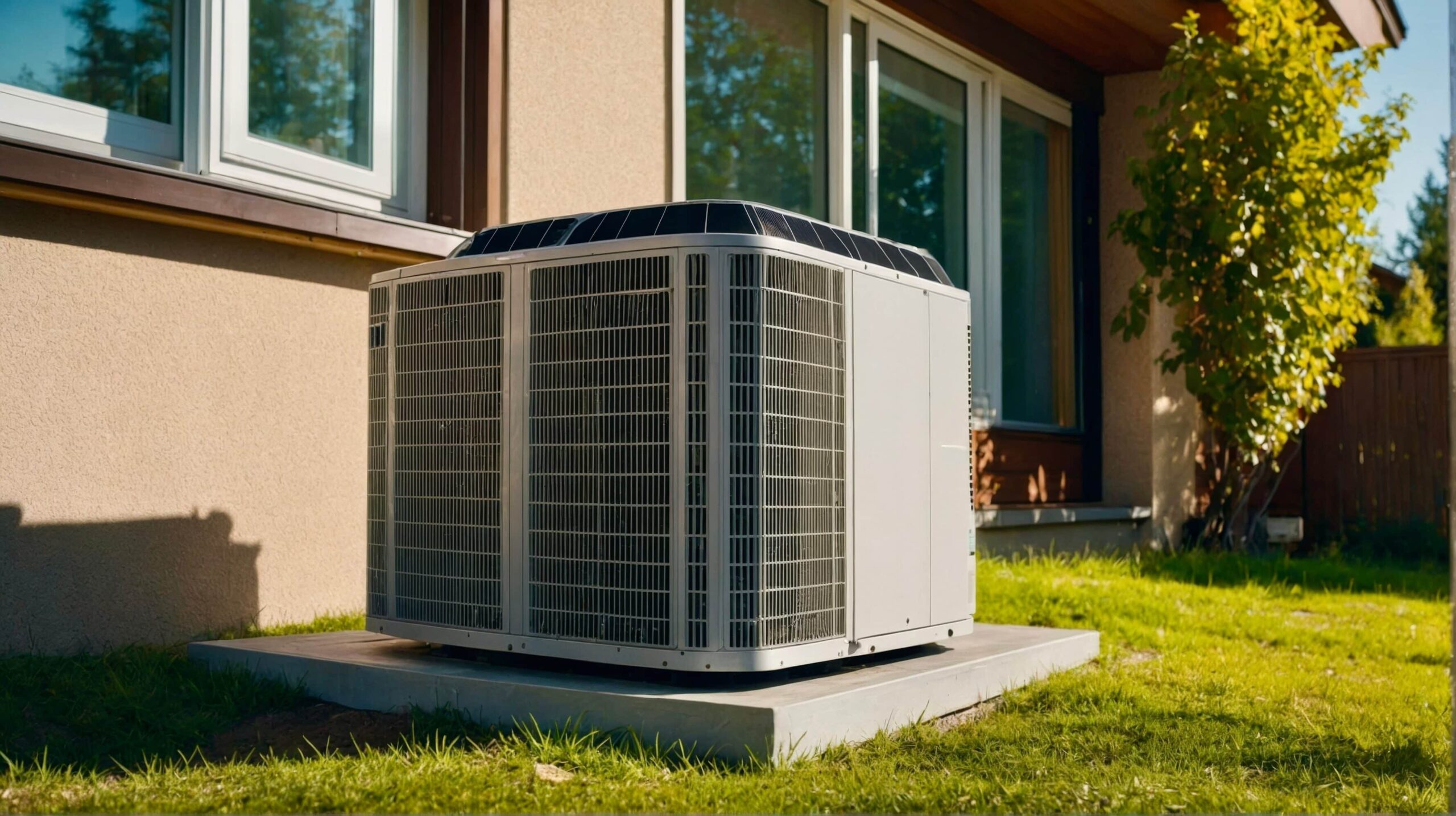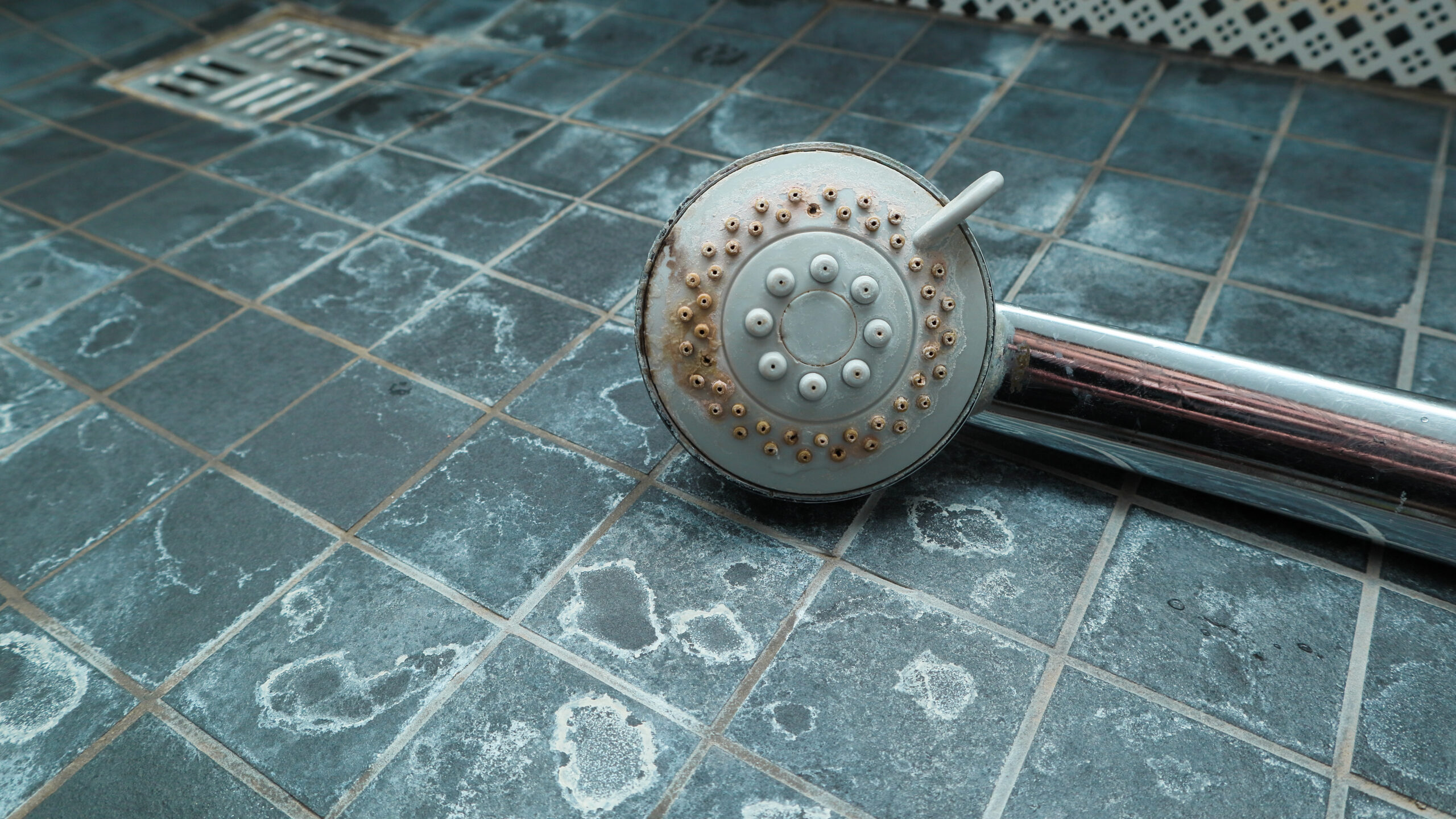|
Getting your Trinity Audio player ready...
|
Combine Your Home’s Heating and Cooling in one System
The unique advantage of heat pumps is simple: they can replace both your AC and furnace or boiler, both cooling and heating your home.
Instead of burning fuel to generate heat, they simply transfer it, making heat pumps an incredibly cost-effective and environmentally friendly option.
What to start thinking about when purchasing a heat pump
As the world moves toward more sustainable energy solutions, heat pumps consistently rank at the top of the list of efficient home HVAC systems.
Heat pumps can also be combined with an existing furnace or boiler, to be utilized together as a hybrid system during the coldest parts of the year.
Heat pumps significantly reduce or eliminate your dependency on fuels like oil, propane and natural gas.
The 3 big questions:
1. How much will this cost?
2. What are my options?
3. Am I hiring a quality HVAC company?

This guide will get you up to speed with a strong understanding of your heat pump options and the decisions you’ll need to make before speaking with installation companies like us.
Taking the time now to learn about heat pump systems will ensure that you end up with the right one in your home for years to come.
Table of Contents
Click on any chapter to jump to that section
- Chapter 1: Installation Costs
- Chapter 2: System Types
- Chapter 3: Energy Efficiency
- Chapter 4: Heating & Cooling Needs
- Chapter 5: Accessories
- Chapter 6: Thermostats
- Chapter 7: Choose an Installation Company
- Chapter 8: Installation Scheduling
Chapter 1
What Factors Determine the Cost of Your Heat Pump Installation?
Your heat pump installation budget will go hand in hand with your home’s heating and cooling priorities, both within and outside of your control.
The details of your heat pump system selections will directly impact total costs. As you become more familiar with heat pump options you should start to get a good idea of what is, and isn’t, at the top of your wish list.

There are 7 determining factors that will go into calculating the total cost of your heat pump installation:
1. System Type
2. Energy Efficiency
3. Your Home’s Needs
4. Installation Complexity
5. Accessories
6. Your Geography
7. Quality of Your Installation Company
Pricing Factors:
1. System Type
Heat pumps, like air conditioners, can throttle their temperature output through different compressor types.
The decision to move forward with a single-stage, two-stage, or variable-speed system has big implications on the level of comfort you’ll feel, system efficiency, your utility bills, and the wear and tear on the system.
While the number of stages you choose is only one variable in the pricing equation, it’s among the most significant factors.
Single-stage heat pumps typically range between $12,000 and $20,000
Two-stage heat pumps typically range between $14,000 and $24,000
Variable-speed heat pumps typically range between $15,000 and $25,000
Jump to Chapter 2: Understanding AC System Types
What is Equipment Matching?
Heat pumps can use your furnace’s blower motor to support airflow through your ductwork and to your vents.
This overlap in components is called equipment matching, as you’ll have to consider what type of furnace, if any, you have when selecting a new heat pump system.
- Single-stage heat pumps are compatible with any type of furnace.
- Two-stage heat pumps are compatible with two-stage or variable-speed furnaces.
- Variable-speed heat pumps are only compatible with variable-speed furnaces.
Homeowners who don’t have a furnace will need to purchase an air handler (pictured below) when installing a heat pump. This will add anywhere from $5,000 to $8,000 to the total installation costs.
Pricing Factors:
2. Energy Efficiency
Heat pumps are renowned for their energy efficiency. Unlike traditional heating systems that generate heat by burning fuel, heat pumps only move heat, which requires significantly less energy.
Since they both heat and cool your home, heat pumps get two efficiency scores. Seasonal Energy Efficiency Ratio (SEER2) and Heating Seasonal Performance Factor (HSPF2) ratings track heat pumps’ energy usage for cooling and heating respectively.
The installation costs of your heat pump are almost always directly related to these scores. Generally, as the system’s SEER2 and HSPF2 rating increase, so does price.
Jump to Chapter 3: Understanding AC Efficiencies
Pricing Factors:
3. Your Home’s Cooling Needs
The heating and cooling capacity, also called the system’s size, of a heat pump is measured in British Thermal Units (BTUs). The unique characteristics of your home will determine how many BTUs of heating and cooling you’ll need.
Your heat pump’s size and installation price are directly related.
Jump to Chapter 4: The AC Sizing Needs of Your Home
Pricing Factors:
4. Installation Complexity
Some heat pump installations are more complex than others and have the potential to bring additional costs. These situations may include:
- Making ductwork modifications to properly match it with your new AC unit, or to physically fit the system into place.
- Hanging the outdoor unit on the side of the house if there is no space for it on the ground.
- Cutting holes through drywall or the exterior of your home to run lines or wiring.
- Making additional modifications to create access to span the distance needed for lines or wiring.
- Attic Installations can require additional manpower during the summer as temperatures range between 125°F and 160°F.
- Ease of access and workability can sometimes cause extra work or added time.
- Additional Materials such as new refrigerant linesets, ductwork or wiring.
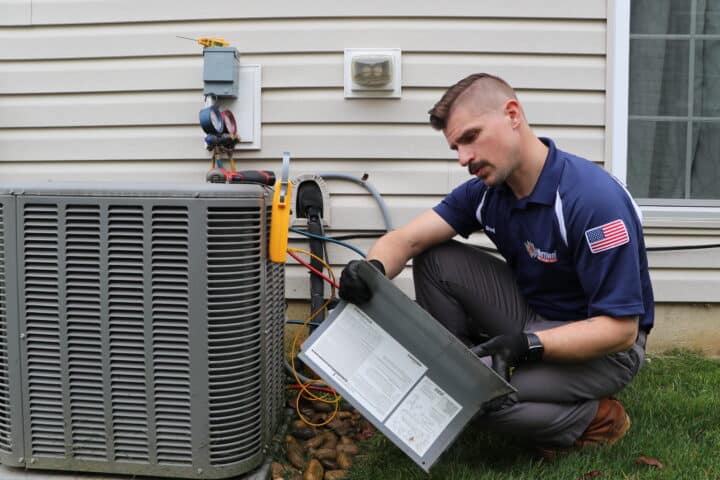
Pricing Factors:
5. Accessories
HVAC Accessories provide humidity control, indoor air quality improvements, and enhanced convenience of your heating and cooling systems.
These enhancements to your heating and cooling systems make any home a more inviting place to live. You’ll see savings on HVAC accessory system installation costs by purchasing them at the same time as your heat pump.
- Whole-House Dehumidifiers cost around $3,000 to install.
- Whole-House Humidifiers cost between $900 and $3,500 to install. Actual prices depend on the size of space being treated.
- Whole-House Air Scrubbers cost around $1,600 to install.
- Whole-House Air Purifiers cost around $1,500 to install.
- Fresh Air Intake Systems cost between $2,000 and $5,000 to install. Actual prices depend on the type of system installed.
- Smart Thermostats cost between $700 and $1,200 and may be required for your home if you’re installing a variable-speed system.
Jump to Chapter 5: HVAC Accessories
Pricing Factors:
6. Your Geography
Like many other services, where you live plays a role in the final installation costs of your new heat pump.
HVAC prices are typically average to above average in the suburban Philadelphia area compared to other regions of the country.
While your geography is largely out of your control, being mindful of how it affects heat pump installation costs can help you understand if you’re getting a reasonable quote or not.
Pricing Factors:
7. Your Installation Company’s Quality
Not all HVAC installation companies are created equal. The quality of the company providing your installation services, and how they train their installers, is going to affect the total cost of installing your new heat pump system.
It’s not uncommon to get a lower quote from a company that’s less professional and more likely to overlook the details of a quality installation.
An HVAC installation company that provides trained, licensed, and experienced installers will deliver a quality installation that may come at a higher price but will set your new heat pump system up for optimal performance, efficiency, and longevity.
Jump to Chapter 7: Choosing an HVAC Company

- 4 Common Mistakes to Avoid When Choosing Your HVAC Company
- Pros & Cons of Independent Contractors vs. Non-Equity vs. Private Equity HVAC Companies
Heat Pump Affordability and financing options
Your HVAC installation partner should be able to provide some financing options to help make your heat pump purchase more affordable.
At Mattioni, we’re happy to extend a 12-month, interest-free payment plan on all our new system installations. This payment structure applies to indoor air quality and humidity products as well, giving you total control over how you pay for your HVAC system upgrades.
We also offer financing options that include terms of up to 10 years. Check out our financing page to see if you’re pre-qualified.
Financial incentives like rebates and federal tax credits may be available for higher efficiency heat pumps. Be sure to talk to your HVAC partner about qualifying systems and ways to take advantage of these incentives.
Chapter 2
Understanding Types of Heat Pumps
Heat pumps, like other heating and cooling systems, have the ability to throttle their temperature output and are classified into three system types: single-stage, two-stage, and variable-speed.
Think of this like gears or “speeds” on a bike: if you have more speeds, the ride will be smoother and you’ll use less energy.
Single-Stage Heat Pumps
- Adequate Heating and Cooling at Low Upfront Costs
Two-Stage Heat Pumps
- Enhanced Comfort and Higher Efficiency
Variable-Speed Heat Pumps
- Optimal Comfort and Highest Efficiency
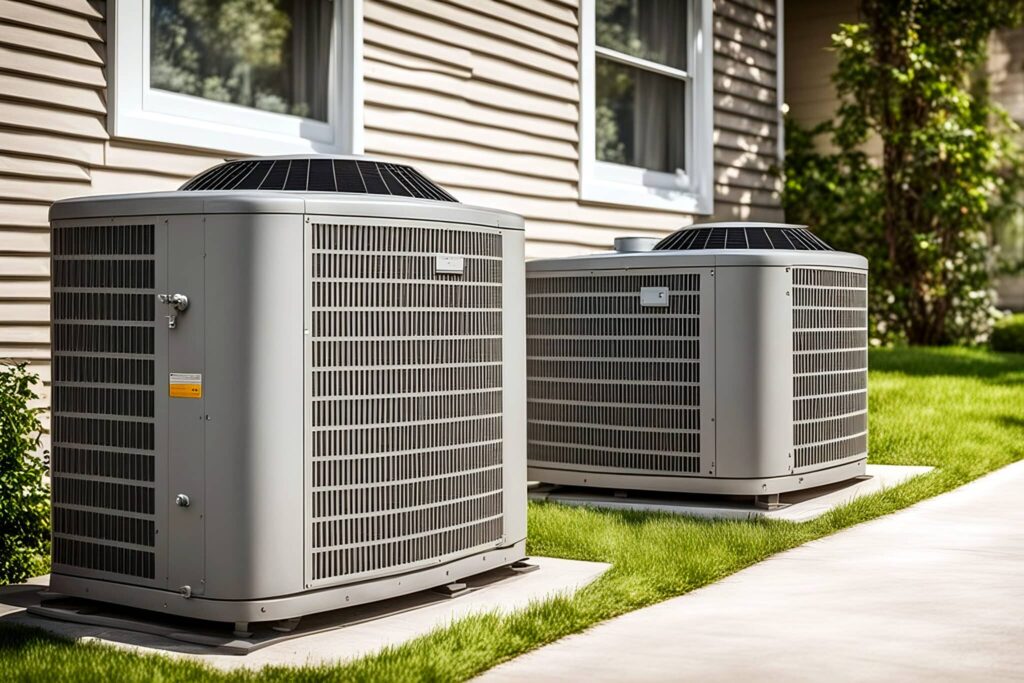
Single-Stage Heat Pumps: Pros and Cons
- Quickly Achieves Thermostat Temperature
- Lowest Up-front Installation Cost
- May Experience Comfort Short Cycles
- Low Energy Efficiency
- Requires Regular Maintenance
- Shortest Relative Lifespan
Single-stage heat pumps can only run at 100%, operating at full blast or completely off. They offer quality heating and cooling with some gaps in comfort at a lower efficiency rating and a lower price point.
Two-Stage Heat Pumps: Pros and Cons
- Quickly Achieves Thermostat Temperature
- Higher Up-front Installation Cost
- Experiences More Consistent Comfort
- Higher Energy Efficiency
- Requires Regular Maintenance
- Longer Relative Lifespan
Two-stage heat pumps have an additional run speed of around 65%, increasing heating and cooling comfort, efficiency, and price.
For instance, if your set thermostat temperature is relatively close to the current temperature, then the system can identify that it should utilize the lesser run speed. When this happens, your system will run for a longer period of time, resulting in a few things:
1. Sustained comfort. Two-stage systems can provide a slower, but steadier, influx of cool air to your home, reducing the length of time when the system turns off. The effect of this is that your home will stay closer to your set temperature, keeping you more comfortable.
2. Fewer start-up sequences. This will lead to less wear and tear and a decrease in energy consumed by the system. In the long run, this means the system will run into fewer issues and you’ll see savings in your monthly electric bill.
Variable-Speed Heat Pumps: Pros and Cons
- Quickly Achieves Thermostat Temperature
- Highest Up-front Installation Cost
- Consistent Temperatures For Sustained Comfort
- Highest Energy Efficiency
- Requires Regular Maintenance
- Longest Relative Lifespan
Variable-speed heat pumps can run at virtually any speed between 30% and 100% for maximum comfort and efficiency, at a higher price point.
This further minimizes the time between the influx of cool airflow into your home, leading to:
1. Optimal comfort. Variable-speed heat pumps will do the best job of keeping your home near your desired temperature.
2. Greatest energy savings. Compared to the energy drawn during a start-up sequence, heat pumps use relatively little to stay running, meaning variable-speed systems are the most efficient and give you the most savings on energy bills.
3. Longest potential lifespan. While they have the longest expected lifespan, variable-speed heat pumps are comprised of the most moving parts which makes them the most dependent on regular tune-ups and proper maintenance.
Chapter 3
Heat Pump Energy Efficiencies: Understanding SEER2 & HSPF2 Ratings
The Seasonal Energy Efficiency Ratio, or SEER2, measures how cooling systems perform under specific conditions. It’s a scale from 13 to 26 that represents the total heat removed from the conditioned space during the annual cooling season. In Pennsylvania, the Department of Energy has set energy regulations that mandate a minimum SEER2 rating of 13.4. SEER2 ratings typically increase as you move from single-stage to two-stage to variable-speed air conditioners.
The Heating Seasonal Performance Factor (HSPF2) measures the efficiency of heating delivered to your home by a heat pump. HSPF2 ratings are calculated by dividing the total BTUs (British Thermal Units) delivered to your home by the total expenditure of energy used by the system, measured in kilowatt-hours (kWh).
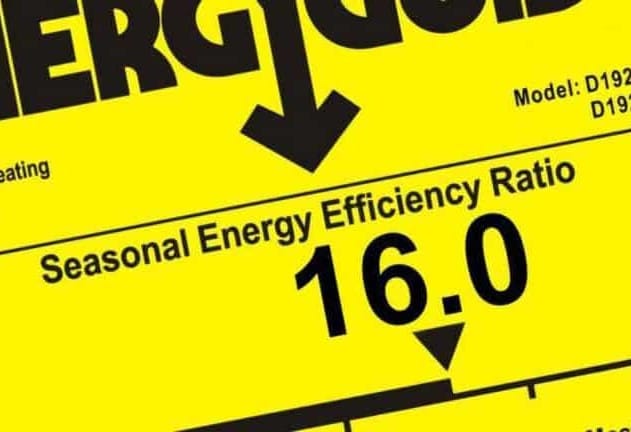
Why Does Efficiency Matter?
The two primary implications of an energy-efficient heat pump are:
1. Fewer greenhouse gas emissions with a smaller carbon footprint
2. Greater savings on energy bills
Chapter 4
The Heating & Cooling Needs of Your Home
Selecting a heat pump system with the appropriate heating and cooling capacity, that matches your home, is essential to optimizing comfort and energy costs, while also promoting the health and longevity of the system.
When selecting a heat pump for your home, you’ll be faced with a range of heating and cooling capacities, measured in British Thermal Units (BTUs), to choose from.
Your home’s square footage is the first variable when determining how many BTUs you’ll need, however it isn’t a simple calculation.
Bringing a professional out to evaluate your home is the best way to find a well-suited heat pump.

Factors Impacting Tonnage Needs:
- Your home’s square footage
- The size of your existing ductwork
- The insulation rating of your home, windows, and doors
- The number and size of windows and doors
- The number of people living in your home
- The direction your home is facing and the amount of sunlight it receives
- The appliances in your home
- The color of your home’s exterior and roof
Get to Know Your Ductwork
Installing a system that’s too large for your ductwork can cause issues like weakened airflow, hindered energy efficiency, and increased wear and tear on the system. Similar issues arise if your system is too small for your ductwork.
Finding a system with the heating and cooling capacity that matches your home and the size of your ductwork is among the most important stages of your heat pump search.
Determining the “sweet spot” of BTUs for your home will support adequate airflow and keep the system running smoothly and efficiently.
Chapter 5
HVAC Accessories: Enhancing Your Comfort
Looking to boost your home’s comfort? Explore a range of additional accessories for your heat pump that enhance your home’s atmosphere through humidity control, indoor air quality improvements, and convenience-oriented smart thermostats.
Manage Your Home’s Humidity Levels
During the summer, humidity inevitably creeps into your home. If ignored, it can lead to musty odors, discomfort, increased asthma and allergy symptoms, and mold growth.
On the flip side, excessively dry winter air can cause itchy skin, dry eyes, peeling paint or wallpaper, and warped wood.
Installing whole-home humidifiers and dehumidifiers will keep your house in the ideal humidity range of 30%-50% all year long.
Advantages to Whole-Home Humidifiers & Dehumidifiers
- Elevate Comfort Levels
- Protect from Respiratory Ailments like Asthma
- Preserve your Home and Belongings
- Increase HVAC Energy Efficiency
- Fight Mold & Mildew
3 Benefits to Controlling Your Home’s Humidity with Humidifiers & Dehumidifiers
Consider Your Home’s Indoor Air Quality (IAQ)
Every house has some degree of indoor pollutants, also called volatile organic compounds (VOCs), that can cause health problems if ignored. Installing a system designed to improve IAQ will make your home a healthier and more welcoming living space.
Air Purifiers: Industry-Leading Filtering Systems
Air purifiers use a series of high-grade filters housed directly in your ductwork to facilitate and clean your home’s entire air supply.
They trap contaminants and VOCs that would otherwise roam freely.
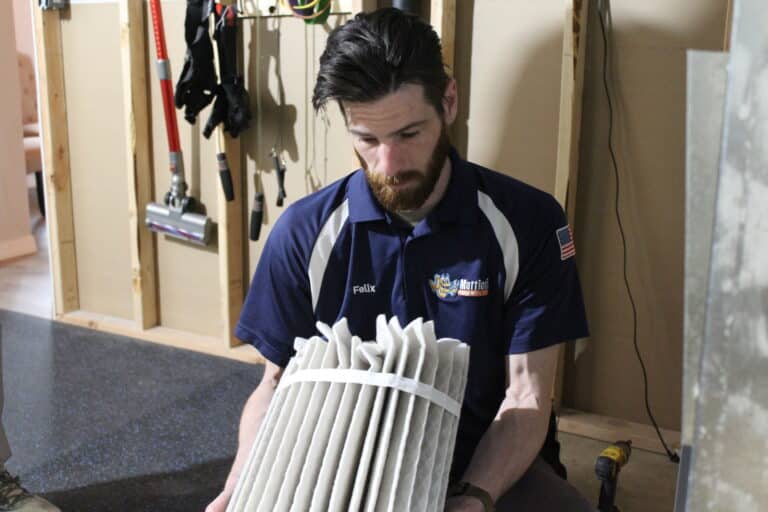
Air Scrubbers: Microscopic Space Cleaning
Air scrubbers attack VOCs microscopically while they linger in your home’s air by sending out UV-C radiation and charged molecules.
This process clumps VOCs together to until they reach a size that can be trapped in your air purifier, or can land on a surface and be sanitized.
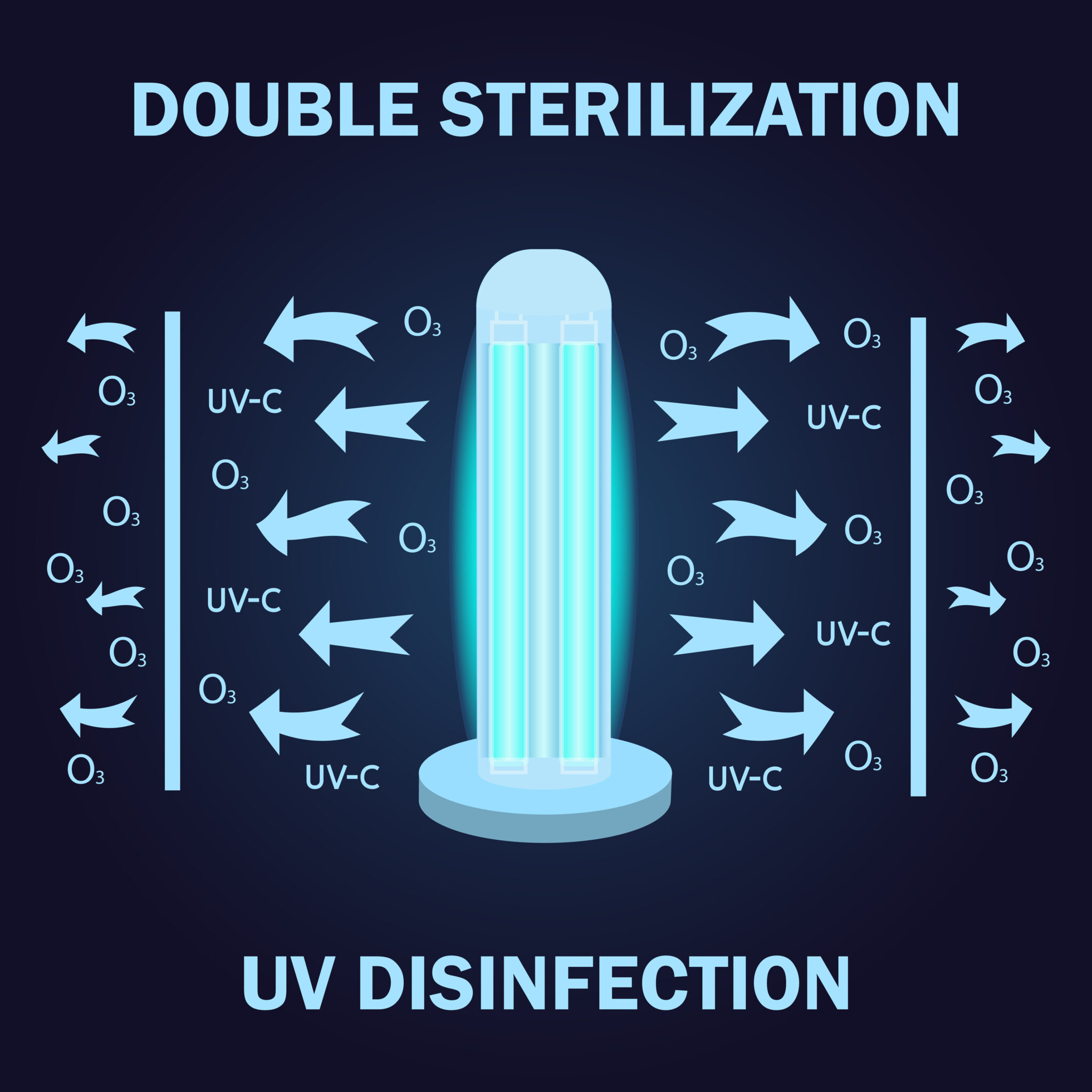
Fresh Air Intake Systems: Breathe Easy 24/7
Fresh air intake systems regularly and automatically exchange stale, indoor air with fresh outdoor air through a simple 6″ hole in your home’s exterior.
Fresh air intake systems produce a constant and subtle flow of fresh air into your home.
How (And Why to Improve Your Home’s Indoor Air Quality with HVAC Systems
Rethink Climate Control in Your Home with Zoning
By segmenting your home into different zones and supplying each with individual levels of heating and cooling, not only will you take control of your home’s comfort but you’ll also reduce energy otherwise wasted in zones that you don’t spend much time in.
Installing zoning dampers or a second HVAC system are effective ways to zone your home, but be sure to work with a professional throughout this process. Installing zoning systems without proper ductwork considerations has the potential to backfire and further hinder airflow.
Is HVAC Zoning Right For My Home? The Pros & Cons of 2 Popular Zoning Methods
Benefits of Zoning:
1. Climate control of individual room temperatures
2. Reduced energy usage
3. Enhanced system efficiency and longevity
Chapter 6
What Are Your Smart Thermostat Options?
Modern smart thermostats have been completely rethought, even compared to those from only 10 years ago. Discover how a thermostat upgrade can transform how you manage your household.
Not Your Grandfather’s Thermostat
Among the new features now common in all smart thermostats is a geo-fencing capability that will automatically turn your heating and cooling systems on or off as you reach a set distance from your home.
This means that (1) you won’t waste energy while you’re away from home, and (2) your home will always be comfortable when you arrive, even if your schedule changes.
Chapter 7
Choosing the right heat pump installation partner
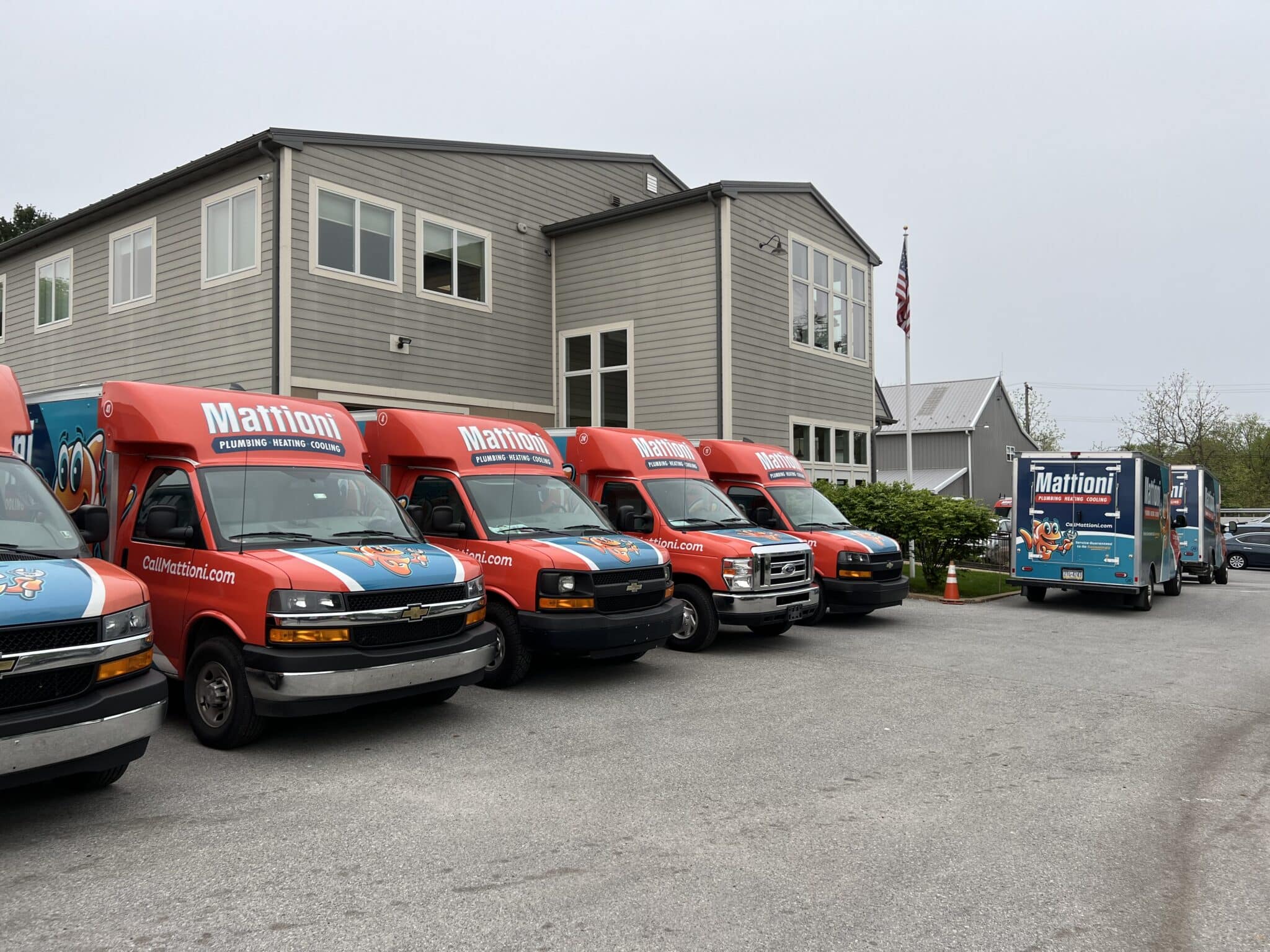
Don’t underestimate the importance of choosing a quality hVAC installation company
How your heat pump is installed has a direct impact on its performance and efficiency.
A referral from a trusted friend is always a great way to start when looking for an HVAC installation company.
Additionally, online resources like Google reviews and social forums with customer feedback are excellent starting points.
When you contact an installation company, pay attention to how each team member treats you. The professionalism shown by one department often reflects the overall quality of service you can expect.
Don’t hesitate to reach out to multiple companies to get a sense of who you’ll be working with.
What to Expect During an In-Home Consultation
Mattioni is proud to offer same-day in-home consultations during which we’ll go through the following steps:
1. Review Your Home Cooling Priorities
2. Analyze Your Existing HVAC System
3. Explore Tailored Options
In-home Consultations are crucial to choosing the right heat pump
An in-home consultation only takes about one to two hours and allows you to ask questions to a professional face-to-face.
You’ll be able to evaluate all of your options alongside an HVAC professional if you haven’t already chosen a heat pump model.
Most importantly, your HVAC partner will be able to inspect the unique characteristics of your home to ensure that you install a properly sized system.
Chapter 8
heat pump Installation Logistics
What to Expect On the Day of an AC Installation With Mattioni
Meet The Team
On the day of your new air conditioner installation, you’ll have the chance to meet the whole install team, which is usually a crew of 2-3 HVAC professionals.
Review
Our team will review all of the job notes and the job site, ensuring that the install plan set forward by our HVAC expert can be executed successfully.
Verify
At this time, our installers will walk you through the coming install and verify that everything planned for your home fits your wants and needs. They will also walk you through anything they need to do that may affect the rest of the home, such as shutting off any power, gas, or water for a short time.
Do The Work
We will get to work! Our installers will take out any old equipment that is being replaced, and carefully place and install your new equipment.
Check with any Changes
If there are any changes from the initial plan as your new installation progresses, our installers will check with you so that you are aware and so that we can make sure they fit your needs.
Walk-Through
Finally, when the job is complete, we will walk you through the new install of your system, showing you everything that was done and everything that you need to know to run and maintain your new system.
At Mattioni, we always strive for five-star service, so if you have any questions or concerns throughout the process of the install, please let us know and we will be sure to address them to meet your five-star expectations.
heat pump Installation FAQs:
1. Do I need to be home when service technicians are in my house?
While some homeowners may want to be home while the HVAC installation crew is working, it’s not necessary.
2. What day and time can I schedule my installation for?
Depending on availability, you can schedule your installation for as early as 8AM the next business day.
3. Do I need to clean up before my AC installation?
As long as there is access to the installation work site and any other areas that your HVAC installation team may need to operate in, there is no need to clean up beforehand.
4. How long does an AC installation take?
While the amount of time needed to install your new air conditioner depends on the complexity of the job, it will most likely be done within four to six hours.
5. Are there any short-term cooling options to get you to your installation date?
Most of the year, a quality HVAC company will be able to install your new air conditioner within 24 hours. However, for those high-demand situations during the peak of summer, the Mattioni team has a supply of window AC units to lend to anyone experiencing a cooling emergency.
6. What should I do about my pets during installation?
If you have a friendly dog or cat, there is no need to put them in a crate or close them off in a room if, unless you normally do so. We love saying hello to our customer’s pets!
Support After Installation
If you have any questions about your new system or if you need further support to understand how to use it, our team is glad to assist!
You’ll receive a complimentary VIP Membership with any installation. This includes yearly maintenance tune-ups for your system to ensure it continues to operate at peak performance.
Mattioni Plumbing, Heating and Cooling
Family Owned for Over 75 Years
“We’ve switched over to Mattioni the past year and can’t say enough about how pleased we are with this company. Great to deal with, on time, professional, knowledgeable and honest. I highly recommend this company for HVAC & Plumbing.” – Mark S.
“Mattioni has been exceptional for installing a new HVAC at my place. From Kevin’s proposal to Andrew and his crew’s installation process, I could not ask for a better consumer journey. Andrew took the time to explain the new unit and also provided tips for more comfort inside the home. Thank you for the great work. Definitely highly recommended.” – Bora G.
“The Mattioni team has been fantastic in every instance, providing honest, competitive pricing and a high standard of professionalism. We are extremely thankful that we chose to be a VIP member with them!” – Mike C.

The Mattioni family has seen many changes throughout our history, but one thing remains the same: our dedication to our customers.
Now in its third generation of family ownership, Mattioni continues to hold our values above all else.
All of our HVAC service technicians go through a rigorous training and apprenticeship program led by certified trainers, and participate in continued trainings, so that we can bring our customers a 5-star experience.
We proudly serve homeowners in Chester, Delaware, Montgomery and parts of Bucks counties.
Our goal remains simple: provide high quality HVAC installations and service, so that everyone has a comfortable home to live in. Simply put, our services are guaranteed to go swimmingly.

